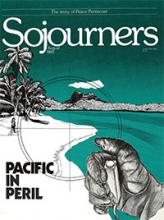Suppose that a country, much stronger than the United States, wanted to establish military bases on U.S. soil. And suppose that over time that country sent large quantities of military aid to Washington to help authoritarian leaders suppress a popular movement that sought to oust those alien bases. Furthermore, suppose that country occasionally used those bases to carry out military operations against countries neighboring the United States. How would Americans feel?
Such questions are now being directed toward Americans by Filipino nationalists and church leaders who strongly resent the U.S. bases in their Pacific archipelago.
For 80 years the United States has maintained extensive military installations in the Philippines. The largest two are Clark and Subic. Clark Air Field, home of the U.S. 13th Air Force, is America's largest overseas air base. Also north of Manila lies the Subic Naval Base, a sprawling naval supply depot and repair facility for the U.S. Seventh Fleet in the Pacific. U.S. military strategists argue that these bases are vital to ensure that shipping lanes in the western Pacific remain open to the United States and its friends.
On June 1, U.S. and Filipino negotiators signed another five-year agreement giving the United States "unhampered use" of the bases in exchange for President Reagan's promise of his "best efforts" to send $900 million aid to the Philippine government of Ferdinand Marcos. Nearly half that amount, $425 million, will be military aid.
Read the Full Article

